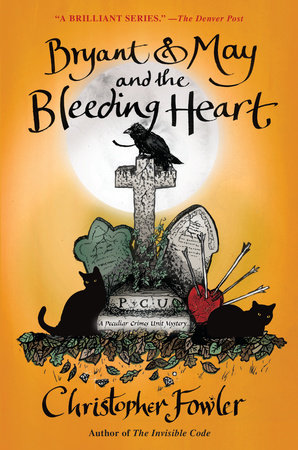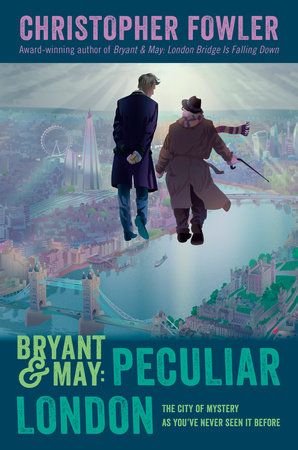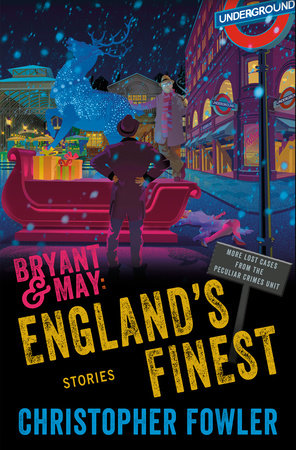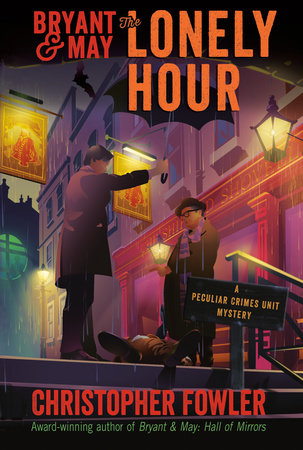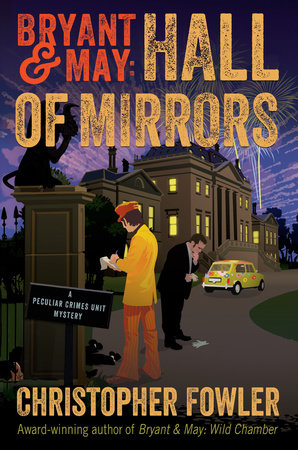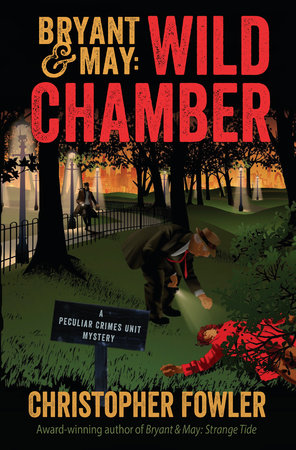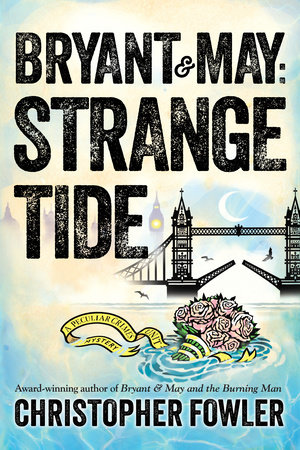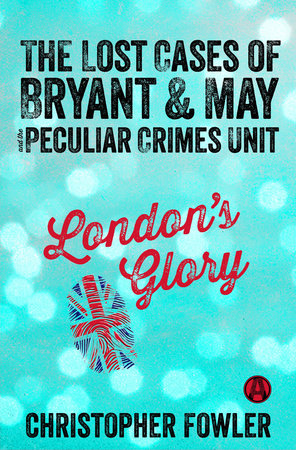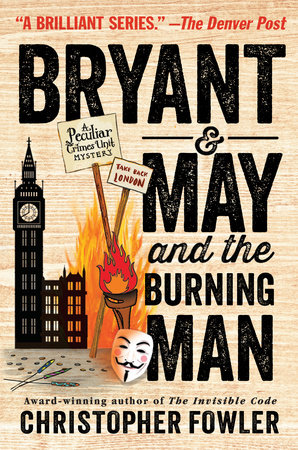Excerpt
Bryant & May and the Bleeding Heart
1.
Dead of Night
F
or a teenager who had never been outside of London, Romain Curtis knew a lot about astronomy. His knowledge seemed pointless in a city where the night sky was usually barricaded behind an immense lid of low sulphurous cloud. When he looked up between the buildings, all he could see was a wash of reflected saffron light. But behind this he sensed the glimmering tracery of constellations, and could point to them with the certainty of a sailor.
Unfortunately it was a talent that impressed no-one, least of all the girls from the Cromwell Estate in Bloomsbury, where he lived with his mother. Shirone Estanza was no different, and had stared blankly at him when he offered to name the stars, but she still pursued him. She was physically unlike most of the girls he had hung out with—shorter and rowdily brash—but she seemed like a lot of fun. She changed the colour of her nails every week (tonight, acid green) and wore the tightest skirts he’d ever seen. But he was still finding his feet with girls, and couldn’t be sure if he even liked them, or if they liked him.
Romain appeared younger than his fifteen years. He had his father’s flat nose and wide forehead, but never appeared intimidating because he was rail-thin. He read voraciously, preferred heavy metal to hip-hop, and wanted to study textile design at Central St Martin’s. He saw movies about angry West Indian kids on council estates and failed to recognise anything of himself in the characters. His father had told him to be his own man, to keep close with his mates, to stay fit and fight back, pointless advice from a warehouseman who spent his days borrowing money from girlfriends, shuttling between the pub and the fixed-odds terminals in betting shops.
For a kid with hardly any money, London is a city of closed doors. Astronomy was a free hobby. Romain could go to museums and libraries, and sit in parks on clear evenings, using the app on his mobile to identify constellations. Tonight, Shirone had insisted on paying for their drinks in The Gunmakers, a pub she could enter without being carded because one of her brother’s best mates ran the bar. Although Romain had nowhere to take her now, it was a warm, muggy night, and as he had been running wild in the neighbourhood since he was old enough to stand, he knew every dark and secret space for miles around. Leading her down Wakefield Street into the narrow gloom of Henrietta Mews, he reached the closed iron gates of St George’s Gardens and stopped, turning to her.
Shirone had folded her arms and was offering a defiant jut of the jaw. ‘If you think I’m going in there, you’ve got another think coming.’
‘What’s wrong?’ Romain asked innocently. ‘There’s never anyone in here.’
‘Been inside with a lot of girls, have you?’
‘No, what I mean is it’s dead quiet and calm, all grass and trees an’ that, and sometimes it’s dark enough to see the stars.’
‘You gonna start naming ’em all again?’
‘No, I just fancied a sit-down with you. Look.’ He swung a long leg over the black iron railings and stepped lightly down inside. ‘It’s easy. There’s never anyone in here. You need a hand over?’
‘I can manage.’ A moment later she had joined him and was looking around. ‘That’s nice, innit? You didn’t say we was going to a graveyard.’ She pointed to the stone circle of sarcophagi that rose between the paths like sacrificial altars, and the broken line of verdigris-topped headstones leaning against the back wall, under the shade of the plane trees. She had been in the little park many times but had never really taken much notice of the graves before. By day most of them were lost in the shadows.
‘It’s a garden, it’s not used for burials no more, not for ages.’ He ushered her past the headstones, towards a grassy area between the stone memorials. Tall buildings hemmed the park in on all sides. Here, at the backs of several blocks of flats, sheltered by the dense canopy of branches, they moved unobserved. Even the pale nimbus of the moon was lost from view. He dropped to the neatly clipped lawn and pulled out his mobile. She sat more gingerly, wary of ground that felt perpetually damp, even after a few days of dry weather.
‘I got this tracking app that shows you the position of the planets,’ he said, tilting the light to her. ‘See?’
‘How old are these graves?’ asked Shirone, twisting about. She was wearing stretch jeans and very high heels, and sitting on grass of any kind was a tentative activity at best.
‘About three hundred years, maybe more.’ He returned his attention to the phone. ‘See, Ursa Major is right overhead. In Greek mythology, Callisto got turned into a bear and was almost shot with an arrow by her son. He was turned into a bear, too. Ursa Minor. It’s supposed to be the only constellation that never sinks below the horizon.’
‘Yeah, whatever.’
Something ticked down from a nearby tree, a bird releasing a twig, perhaps. Shirone looked as if she was about to spring to her feet. She had no problem pushing her way through a gang of ten classmates but more than three trees in the same place bothered her.
Romain pulled a battered joint from his jacket pocket and dug for his lighter. ‘I used to come here when I was little, for picnics and that.’ Perhaps it was best not to go on about the cemetery, he decided, as it would ruin his chances with her tonight, but he hadn’t been able to think of anywhere else they could go. He dragged on the roll-up and tried to pass it to her, but she pushed his hand away. The sound of a single car, heading south, broke the silence. The little park’s greenery insulated it from surrounding noise.
‘I used to see you around all the time,’ said Shirone, ‘but you never said nothing. I didn’t think you liked me.’
‘It wasn’t that, I just didn’t know what to say. You was always with your brothers.’
‘Yeah. They’d kill me if they found out I was here.’
‘Why?’
‘You’re joking, right? They’re Italian. I’m just half Italian.’ She laid herself awkwardly back on the grass. ‘It’s weird being in here at night. Like we’re in the country. What’s that park in New York?’
‘Central Park.’
‘Yeah. My dad’s got pictures. It’s really big, right, but you can see buildings all around it.’
‘I s’pose it was planned that way. Like a garden.’
‘Yeah, but this’—she gestured vaguely around the green—‘it’s not, is it? It just got sort of left behind. I mean, it was here first, and everything else got built around it. Like it’s the original land, and everything else is just—’
He stopped her with a kiss. He wanted to take it slowly but there was something wonderful about her that he wanted to capture in his mouth. She tasted of mint and lemon; she had chewed the garnishes in her drink.
She broke off and turned her head. He thought he had made the wrong move, but then she raised a hand and said, ‘Listen.’
There was somebody else in the grounds. He heard a scrape, a crack of wood, a grunt, a displacement of earth, a cascade of small stones. He pushed himself up from the ground and looked about. On the far side of the park there was a shuffle of movement, a black-on-grey shape that folded, rose and folded again. It almost looked as if something was coming out of one of the graves. It made him think of a Lucio Fulci zombie film, one of those once-forbidden Italian B-movies that now looked so cheesy on YouTube.
What if Shirone’s thuggish brothers had followed them in? She was fifteen years old, and he was lying on top of her beneath a pall of dope smoke.
‘Get off me,’ she whispered. ‘Someone’s here. Let’s go.’
Reluctantly, Romain rose. To get back to the railings they had to pass whoever was watching. Shirone grabbed the sleeve of his shirt and made him keep up with her.
The curve of the path took them near the wall, the graves and the bushes. As they drew closer, the rowans shook abruptly and violently, scattering leaves and twigs. He could see a figure now, tall and angular, swaying drunkenly. ‘Oi, mate,’ Romain called, ‘what you doin’ there?’
Before any answer came Shirone ran forward, angry at being followed, and began shouting something about perverts. A moment later, her shout turned into a scream.
It was hard for Romain to recall the exact order of events after that. Shirone stumbled into the torn-up earth, twisting her ankle in the gap between the ground and the opened coffin. Romain tried to grab her and failed, knocked aside by the onlooker who had reached out an arm towards him. At some point he remembered seeing the raised lid, the muddy pit, a sliver of moonlight on the empty polished casket.
He saw the man standing above him, middle-aged, with greying hair and occluded eyes, clearly and irrevocably dead, dressed in his best black business suit, his arm still rising, the claw of his right hand extended as if to clutch at the living. Then the moon was unveiled from the clouds, highlighting his silvered pupils, his distended marbling flesh. The arm had risen high to point into the night sky, as if to transmit some dire warning.
Romain could not believe what he was seeing. It was as if all the horror films he had been allowed to stay up late for as a child had rolled into one and come suddenly true. There, in the pale patch of moonlight, a cadaver had risen from the grave and was lurching stiffly through the penumbral gloom. The only way it could be any cooler would be if—
And then that happened, too. The corpse spoke to him. He heard its grunted command and followed its pointing hand. And there in the night above him hung the answer.
As a luxurious sense of panic began to burn through his stoned mellowness, Romain’s senses registered everything at once: the overpowering smell of decay, the body lurching towards him from the grave with its outstretched arm, the putrid sighing of breath. Shirone was still yelling loudly enough to wake the dead single-handedly, and now there was a bright square of bathroom light shining between the branches of the trees, high above the wall against which the row of ancient headstones leaned, in the little park where no-one had stirred from beneath the ground in the last three hundred years.
The body tottered forward and landed facedown in the earth. Suddenly Romain’s excitement seemed absurd, and all he could think of was that he had been tricked and had missed his best chance with Shirone, and that even if they remained friends after this she would never let him touch her again, because a stupid reanimated corpse had spoiled it all.
He glanced back at the dead body, inelegantly sprawled in the dirt, and grabbed Shirone’s hand, which only made her scream more fiercely, so he let it go. She ran for the gate and virtually vaulted it. He followed her out onto the street, but then decided to go back, angered by his flight from something so strange and exciting.
‘Wait here a sec,’ he told her. He needed to take another look.
-- Michael S. Miller Production Manager Scribe Inc. www.scribenet.com 7540 Windsor Drive, Suite 200B Allentown PA 18195 telephone: 267.507.1304


